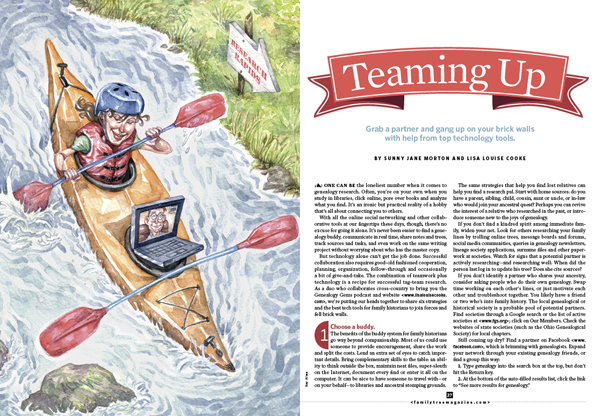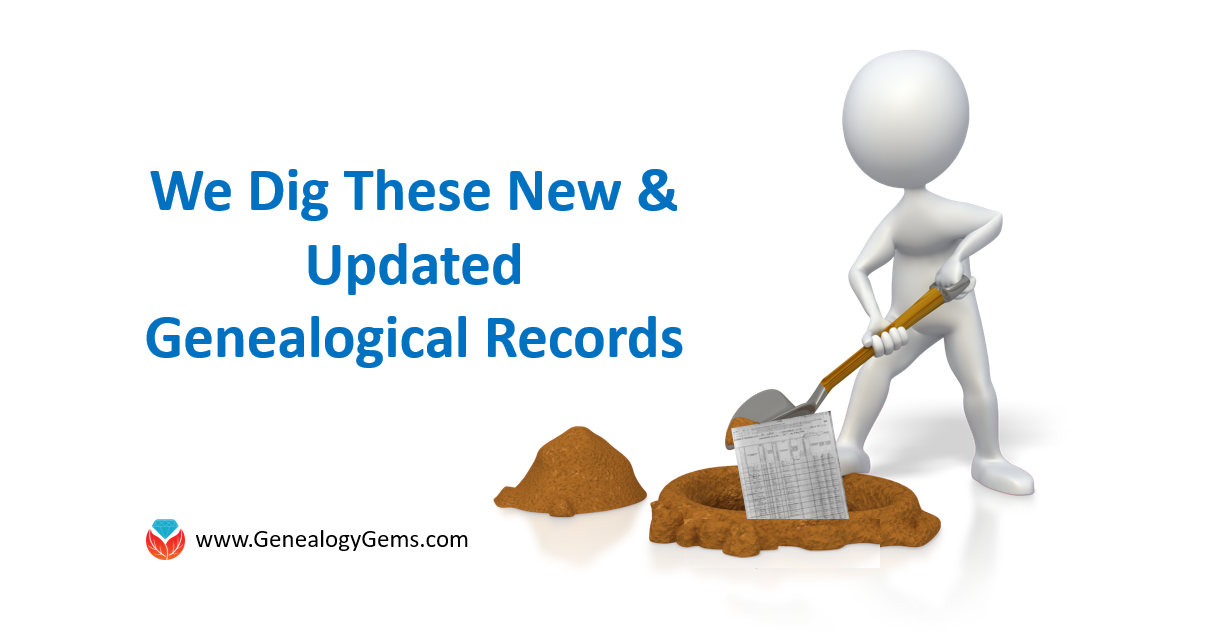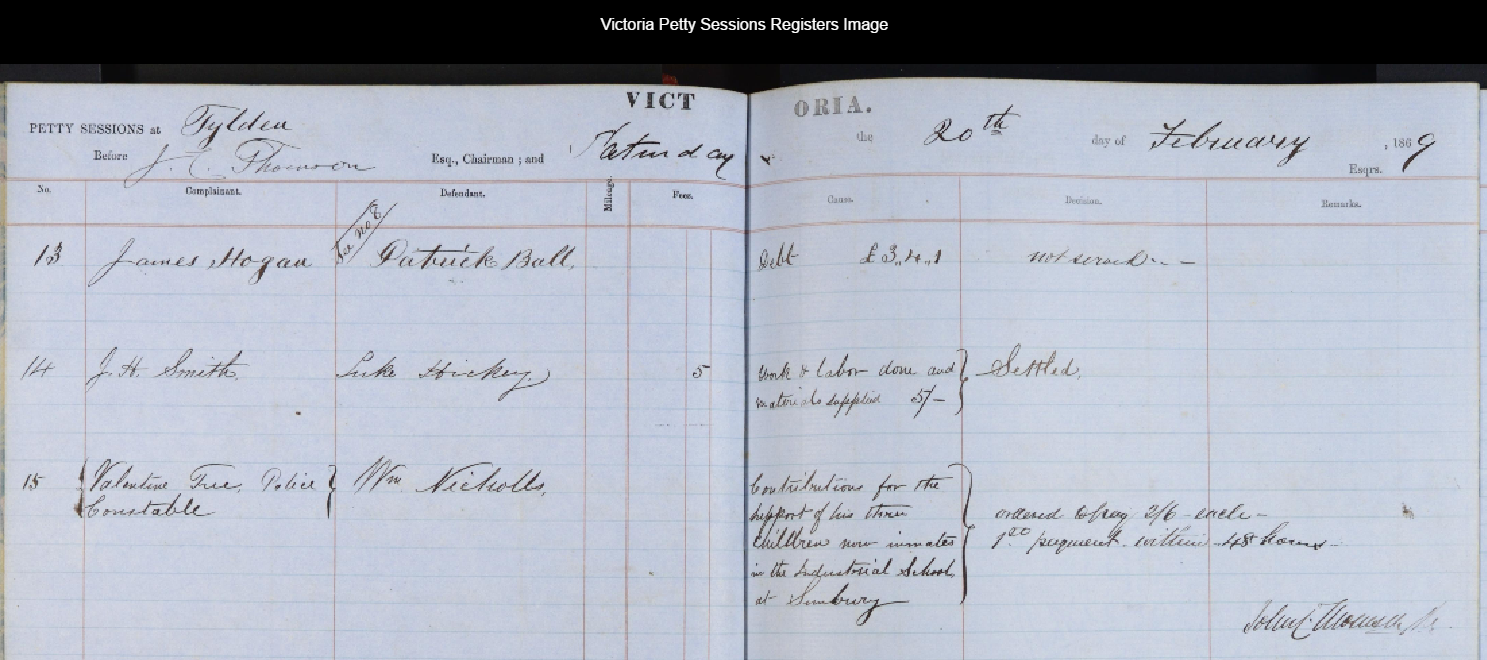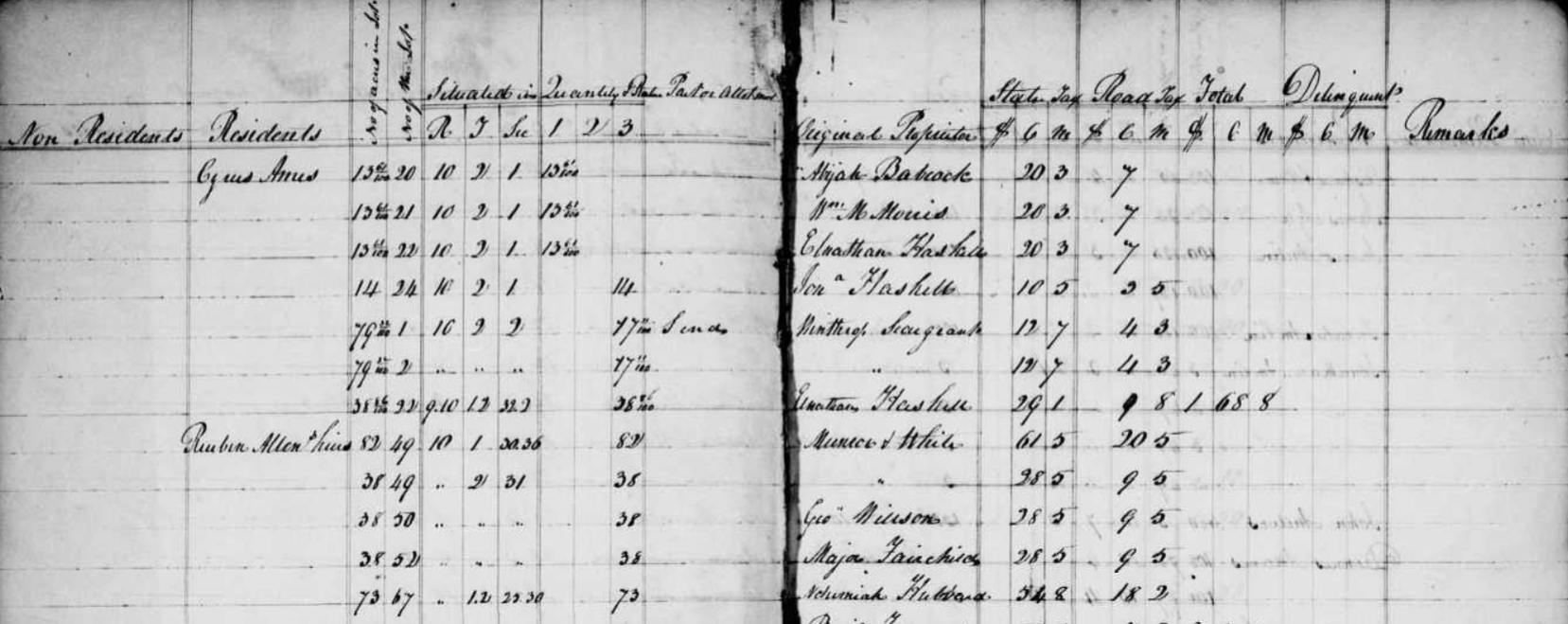by Lisa Cooke | Nov 28, 2013 | 01 What's New, Collaborate, Inspiration, Publishing
 One of the most important things we do as genealogists is share! We share research findings, family stories, trees, heirloom photos and more. These days, sharing online is often the way to go. It’s fast, it’s relatively organized, it gets things into the hands of those who want them and (often) it’s free!
One of the most important things we do as genealogists is share! We share research findings, family stories, trees, heirloom photos and more. These days, sharing online is often the way to go. It’s fast, it’s relatively organized, it gets things into the hands of those who want them and (often) it’s free!
To wrap this series of blog posts on collaborating, I offer 4 ways to share genealogy online (in addition to Dropbox and Evernote, which we discussed in previous posts).
1. Attach scanned documents, photos and stories to your online tree. Whether you keep a tree at MyHeritage, Ancestry, FamilySearch or another site, beef it up with everything you have. That only enriches the body of knowledge out there and gives others a leg up on the next bit of research. You can also include links to applicable notes in Evernote.
2. Post gravestone photos and other burial information at online cemetery sites. BillionGraves and Find A Grave are the two big ones, of course. These sites provide searchability and a platform for collaboration between descendants.
3. Post meaty queries that show what you know and what your questions are. RootsWeb and USGenWeb are two enormous sites, organized by location and topic, where you can post questions about people, places and more. Check out this page on how to write a good query and this Cyndi’s List portal to various message boards. TIP: Remember to include all important related keywords, name and location spellings, and dates in your messages so they are easily found by your long lost cousins using Google!
4. Publish your research. Genealogy newsletters, magazines and journals of all levels (from the local to the national and beyond) want your well-researched, well-written research. What’s a chunk of research you could share? Look for publications that are indexed in PERSI, the Periodical Source Index, because other genealogists are most likely to find your work when it’s indexed there. Of course, family history websites, blogs and books are all great ways to publish your research, too. Just get it out there!
As the online genealogy community continues to grow, our opportunities to grow bigger, better family trees also grow. So my question to you is: What do you have to share? And have you begun?

Check out the magazine article that inspired this series of posts on collaborating. It’s “Teaming Up,” and it appears in the December 2013 issue of Family Tree Magazine. Sharing genealogy files is just one topic we cover. The article itself was a cross-country collaboration between myself and Genealogy Gems Contributing Editor Sunny Morton. To write it, we relied on a lot of the same tips and tools we recommend!
Finally, check out my previous blog posts in this mini-series on collaboration:
Tips for Collaborative Genealogy: Research with a Partner
Tips for Collaborative Genealogy: Dropbox for Genealogists
Tips for Collaborative Genealogy: Evernote for Genealogists
by Lisa Cooke | Aug 16, 2011 |
The Genealogy Gems Podcast Episodes
2011 Season Six
Episode 101 Listen & Show Notes
Tons of great gems in the news, and learn all about becoming a certified genealogist from Alvie Davidson.
Episode 102 Listen & Show Notes
Genealogy Gems News, Updating your Podcast iGoogle Gadget, Research Strategies and an interview with Kendall Wilcox, Executive Producer of The Generations Project about the new Season 2.
Episode 103 Listen & Show Notes
Genealogy Gems News, “Cemetery Justice,” the New Google Books, the New Google Earth Version 6.0 for Genealogy.
Episode 104 Listen & Show Notes
Genealogy and Technology Converge. Interview with professional genealogist Kory Meyerink on the 50 most popular family history websites. Geo-Tagging photos with Chris Bair.
Episode 105 Listen & Show Notes
Interview with Josh Taylor of the New England Historic Genealogical Society on RootsTech. Tips for getting the most out of a conference, NARA videos, and free RootsMagic webinars.
Episode 106 Listen & Show Notes
Lisa shares her experience at the Who Do You Think You Are? Live show held recently in London, as well as some her own Cooke ancestry sleuthing. Interview with New Zealand genealogist Jan Gow on how to create your own family history resource library.
Episode 107 Listen & Show Notes
Free Webinars, the 1911 Scotland Census, Fraternal Organizations, and Dick Eastman joins Lisa to talk about Cloud Computing and Computer Security.
Episode 108 Listen & Show Notes
Census Tips and Tricks with Jason Harrison of FamilySearch. Also how to cite sources from Wikipedia, Lisa finds a newspaper article for a listener, and where to start in looking for Germany records.
Episode 109 Listen & Show Notes
The Civil War 150th Anniversary with Mike Litterst of the National Parks Service. Also, the new Jamboree apps, free upcoming webinars, and a tale of a military heros bible finding its way home again.
Episode 110 Listen & Show Notes
Divorce Research: Little White Lies at the Turn of the Century, free webinar, and special guest Maureen Taylor The Photo Detective from the Who Do You Think You Are? Live event in London.
Episode 111 Listen & Show Notes
Military Records: How to find Invalid and Pension files, New Mexican records, and special guest Roger Kershaw of the National Archives UK gives the back ground on the British Home Children from his book New Lives For Old.
Episode 112 Listen & Show Notes
Helping kids embrace family history at the Genealogy Jamboree.
Episode 113 Listen & Show Notes
Family History Writing with author John Paul Godges.
Episode 114 Listen & Show Notes
Online Security, Records Roundup, Genealogy Blogging with Becky Jamison.
Episode 115 Listen & Show Notes
How to Travel to Your Ancestor’s Homeland.
Episode 116 Listen & Show Notes
The Genealogy Gems Podcast recorded live at the Southern California Genealogical Society Jamboree. Special guests: Allison Stacy, Publisher of Family Tree Magazine, and Certified Graphologist Paula Sassi.
Episode 117 Listen & Show Notes
Find out if you should be using “Flourish” in your genealogy research with my guest DearMYRTLE.
Episode 118 Listen & Show Notes
PERSI, Grandmas and Grandpas and Free Transcription Software.
Episode 119 Listen & Show Notes
Prepare for Family History Christmas Gifts, Listener’s Grandparent Terms of Endearment, and 1000Memories.
Episode 120 Listen & Show Notes
Part 1 of Lisa interview with Washington Post editor Steve Luxenberg, author of the riveting true-story book Annie’s Ghost.
by Lisa Cooke | Feb 3, 2017 | 01 What's New, African-American, Records & databases
American slave records contained in the Digital Library on American Slavery at the University of North Carolina Greensboro have recently been updated. Also in new and updated genealogical record collections this week, records from Australia, United States, and Ireland.

United States – North Carolina – American Slave Records
An expansion of the University of North Carolina Greensboro University Libraries’ Digital Library on American Slavery has added bills of sales. These records index the names of enslaved people from across North Carolina. When complete the project will include high resolution images and full-text searchable transcripts. This digital library also includes other important record projects such as:
Race and Slavery Petitions Project – A searchable database of detailed personal information about slaves, slaveholders, and free people of color. The site provides access to information gathered over an eighteen-year period from petitions to southern legislatures and country courts filed between 1775 and 1867 in the fifteen slave-holding states in the United States and the District of Columbia.
North Carolina Runaway Slave Advertisements, 1750-1840 Project – Online access to all known runaway slave advertisements (more than 2300 items) published in North Carolina newspapers from 1751 to 1840. Digital images, full-text transcripts, and descriptive metadata, are included in this searchable database.
The Trans-Atlantic Slave Trade Database – Among other things, this database identifies 91,491 Africans taken from captured slave ships or from African trading sites. It includes the African name, age, gender, origin, country, and places of embarkation and disembarkation of each individual.
People Not Property – Slave Deeds of North Carolina – When complete, People Not Property – Slave Deeds of North Carolina will include high resolution images, and full-text searchable transcripts. Though still in the working stages, they hope to open the project to states beyond North Carolina, creating a central location for accessing and researching slave deeds from across the Southern United States. Keep a watchful eye on this exciting endeavor!
Australia – Victoria – Court Session Records
Over 3 million Victoria Petty Sessions Registers records have just been released in association with Public Records Office Victoria to coincide with Australia Day (January 26th) 2017. This collection includes both transcripts and scanned images of original court registers. If your ancestors had a run-in with the law, you may find them here.

Snapshot of Victoria Petty Sessions Record from Findmypast.
This collection covers both civil and minor criminal cases. The Court of Petty Sessions’ brief was wide, making these records a powerful resource for those with Australian ancestors. Your ancestors may appear as a witnesses, defendants, complainants, or even as a Justice of the Peace. Cases include merchants who had not paid duty on their goods, to workers suing for unpaid wages. Debts were also collected and disputes settled. Public drunkenness was a common offence, as was assault and general rowdiness.
The registers available in this collection cover the years between 1854 and 1985. Transcripts will list the event date, your ancestor’s role (whether plaintiff, defendant, etc.), cause or reason for the case, the court it was held at, the date, and a brief description. Images may provide additional details.
Australia – Queensland – Passenger Lists
Also at Findmypast, Queensland Custom House Shipping 1852-1885 passengers and crew with over 107,000 records of passengers and crew that made voyages between 1852 to 1885.
These transcripts list information taken from original documents held by the National Archives of Australia and will allow you to discover your ancestor’s age, nationality, occupation, date and port of arrival, date and port of departure, and the name of the ship they sailed on.
United States – New York – Passenger Lists
The collection
New York, Book Indexes to Passenger Lists, 1906-1942 at FamilySearch consists of images of the indexes to passenger manifests for the port of New York. The indexes are grouped by shipping line and arranged chronologically by date of arrival. Additional images will be added as they become available.
United States – Ohio – Tax Records
The records included in the Ohio Tax Records, 1800- 1850 at FamilySearch contain both the index and images to taxation records as recorded with the County Auditor of each county. The records in this collection cover the years 1800 to 1850. However, the majority are from the years 1816 through 1838. Entries are recorded in voucher books and one person per page. Included are the following Ohio counties:
- Ashtabula
- Belmont
- Carroll
- Columbiana
- Guernsey
- Harrison
- Jackson
- Jefferson
- Monroe
- Trumbull
- Washington

Snapshot of an Ohio Tax Record via FamilySearch.org
Governments created tax records that vary in content according to the purpose of the assessment. Most are based on personal property, real estate, and income. They are particularly useful for placing your ancestor in a particular area year after year, hopefully leading you to other helpful records.
United States – Massachusetts – Revolutionary War Index Cards
FamilySearch has updated the Massachusetts, Revolutionary War, Index Cards to Muster Rolls, 1775-1783 collection this week. These index card abstracts are of accounts, muster and pay rolls, and descriptive lists and accounts, of soldiers who served in Massachusetts companies and regiments during the Revolutionary War, 1775-1783.
Examples of Card Abstract Types
- An Account -Mass. Archives Depreciation Rolls
- Company Return – Coat Rolls Eight Months Service
- Continental Army Pay Accounts – Continental Army Books
- A Descriptive List – Mass. Muster and Pay Rolls
- Lexington Alarm Roll – Lexington Alarms
- List of Men Mustered – Mass. Muster and Pay Rolls
- List of Men Raised to Serve in the Continental Army
- Muster and Pay Roll
- Muster
- Order for Bounty Coat – Coat Rolls Eight Months Service Order
- Order – Mass. Muster And Pay Rolls
- Pay Abstract – Mass. Muster and Pay Rolls
- Pay Roll
- Receipt for Bounty – Mass. Muster and Pay Rolls
- A Return
- Statement of Continental Balances
Ireland – Newspapers
This month’s enormous Irish Newspapers update at Findmypast contains over 1.2 million articles. Seven brand new titles have also been added including the Leinster Leader, Donegal Independent, Kildare Observer & Eastern Counties Advertiser, Wicklow News-Letter & County Advertiser, Longford Journal Wicklow People, and the Ballyshannon Herald.
Newspapers are a great source for vital information when records cannot be found. To learn more about using newspapers for genealogy research, read Lisa Louise Cooke’s top-notch tips in Everything You Need to Know About How to Find Your History in Newspapers.
 One of the most important things we do as genealogists is share! We share research findings, family stories, trees, heirloom photos and more. These days, sharing online is often the way to go. It’s fast, it’s relatively organized, it gets things into the hands of those who want them and (often) it’s free!
One of the most important things we do as genealogists is share! We share research findings, family stories, trees, heirloom photos and more. These days, sharing online is often the way to go. It’s fast, it’s relatively organized, it gets things into the hands of those who want them and (often) it’s free!



